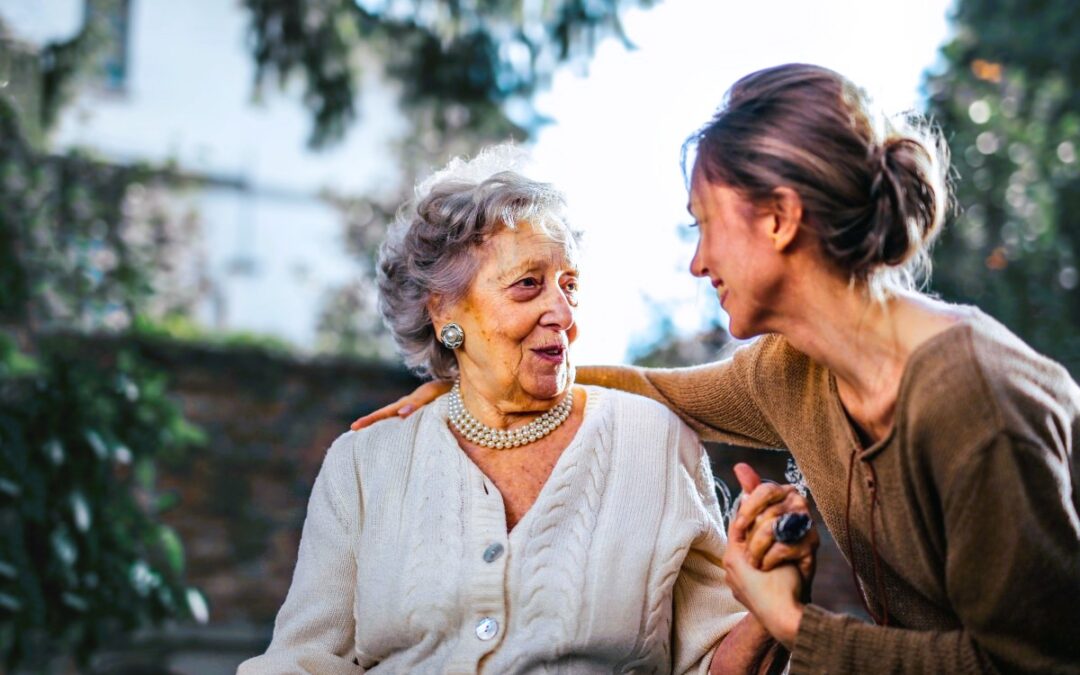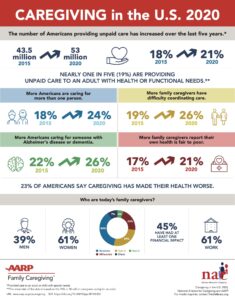Like many of my friends, I am the main caregiver for my dad. While we don’t live in the same city, I manage most of his care, and visit him once or twice a week. It’s both a privilige and a source of stress. It’s very hard to see a loved one in pain, getting weaker, and losing treasured abilities.
More people are involved in unpaid caregiving for a family member, and it’s taking a toll on their own wellbeing. The National Alliance for Caregiving (NAC) and AARP run a study on caregiving in the US roughly every 5 years. Their most recent results are from 2020, and I wouldn’t be surprised if numbers are even higher today:
I recently met the wonderful coach Marika, who specializes in supporting caregivers, and she was kind enough to let me publish an article that originally appeared on her blog. Marika’s own experience is in caring for her husband who battled cancer, but I find that her lessons and advice are relevant to any caregiver. If you’re caring for someone, I really hope that you will implement some of her advice. As always, I’m happy to support you.
Growth through adversity
Resiliency Coach and recovering perfectionist Marika Humphreys coaches people who are caregiving for a partner. Five years as her husband’s caregiver and primary emotional support as he battled cancer, Marika knows how challenging and exhausting it can be. She teaches her clients how to calm their mental and emotional turmoil and use this time as an opportunity to grow and become stronger than they thought possible.

4 Tips for Relieving Cancer Caregiver Stress When Caregiving Becomes Too Much
“It’s too much. I can’t do this anymore.”
If those thoughts are swirling around your head lately, it’s time to pay attention. You may be tempted to push them aside or ignore them, but don’t! While you may even feel guilty for thinking this way (you’re not the one with cancer, after all), I want you to listen because when caregiving becomes too much, it doesn’t mean you’re a bad or selfish person. It’s simply an indication that you’ve been so focused on caregiving that you haven’t been paying attention to your own needs. If you can relate, keep reading to learn more about cancer caregiver stress signs and how to find the support you need.
What are Three Signs of Caregiver Stress?
Stress looks different on all of us, but there are three caregiver stress signs that often arise when you’re feeling burnt out and overwhelmed. Many of these symptoms will come up for caregivers periodically, but it’s time to make a change when they become consistent and persistent.
1. Feeling Irritable and Short-Tempered
If you wake up grumpy and irritable, are short with people, find yourself making snide comments, or are just being kind of rude, it’s an indication that something is going on. I’m not talking about having a bad day. I’m talking about feeling this way most days. Having a “short fuse” and losing patience often and easily are signs of extreme stress.
2. Feeling Exhausted and Always Tired
Are you consistently waking up at 2 am, unable to go back to sleep? Are you exhausted all the time? Are you sleeping but still feeling tired no matter how many hours of rest you get? Constant exhaustion and fatigue are big indicators that you are under cancer caregiver stress.
3. Feeling Sad and Constantly Worried
If you find yourself disinterested in things you used to enjoy or unable to silence your mind and experience a moment of peace, there’s a good chance you’re experiencing cancer caregiver stress. While it’s normal to feel sad and worried at times throughout this journey, when caregiving becomes too much, you’ll start feeling it all the time without relief.
Other Caregiver Stress Signs
Cancer caregiver stress signs can also include physical changes, such as weight loss or gain, frequent headaches or body aches, or other physical problems. Often, emotional and mental stress and exhaustion manifest themselves physically. All of these signs are important to pay attention to! This is your body’s way of trying to get your attention.
Time to See a Therapist?
Many of the signs I’ve mentioned above could also be an indication of depression. I am a life coach, not a therapist. If you are starting to feel like you can no longer function in your life and handle the daily demands, I encourage you to consider finding a therapist. If, on the other hand, you feel like you are functioning but just having a hard time with it, then read on.
What to Do When Caregiving Becomes Too Much
Now you know the cancer caregiver stress signs. If you’re experiencing them, what do you do? Here are four ways to relieve stress when caregiving becomes too much.
1. Make Sleep a Priority
Listen, if you are not getting good quality sleep AND are facing the challenges of caregiving daily, you simply won’t have the energy to handle them. Sleep is critical to maintaining your energy and ability to think clearly. It’s also the first thing you’ll likely struggle with when your partner is sick.
Getting adequate sleep needs to be a priority. Even if you are a person who used to get by on 5-6 hours, you’re in a different situation now. As a caregiver for your partner, you’re facing more mental and emotional challenges than before, which will take a toll on your energy. So making sleep a priority is necessary to get through this time.
Improving your sleep starts with you valuing its importance. It can be too easy to brush off this vital piece of our lives. Don’t! If I haven’t convinced you here, just Google “the importance of sleep,” and you’ll find plenty of evidence. Now that you know how valuable sleep is, there are a few simple things you can do to clean up your sleep hygiene.
Eliminate screens before bed.
Turn off ALL electronic devices at least 1 hour before bed. No phones, no TV, no computer, period. No checking the news, texting your friend, swiping through IG, or playing a mindless game. Our electronic devices stimulate our minds and interrupt our brains’ natural sleep preparation. We need to allow our minds to shut down to get good sleep. Instead, try reading, music, or meditation. If you’ve never tried a sleep story, I highly recommend them! You can listen for free on the podcast “Get Sleepy” or through many apps like Calm.
Make your room dark and cool.
You will get better quality sleep when your room is cool and dark. This is the environment our bodies evolved in, and any artificial light interrupts our sleep patterns. If you need a night light, consider wearing a sleep mask. This has become normal for me, and now I don’t think twice about it. (I also wear earplugs, which have become a game changer in my ability to get deep sleep).
Have a caffeine curfew.
Caffeine doesn’t give you energy; it masks your fatigue. And it stays in our system for a long time (taking 6-8 hours for only half of the caffeine in your system to wear off). So, set a caffeine curfew for 2 pm or earlier. If you feel like you need it just to get through your day, try a 10-minute nap instead. Your body needs the rest!
Take a nap.
As a caregiver, you should expect there to be some sleepless nights. There may even be periods when you need to be alert to your partner and their health during the night. However, multiple sleepless nights can’t be the norm. It’s simply not sustainable. So, if you can’t sleep at night, plan to get it during the day. This isn’t a luxury. It’s how you maintain your health as a caregiver and avoid extreme cancer caregiver stress.
There are lots more ways to improve your sleep, and getting a coach to help you deal with all your worries is one of them! If you want to learn more, you can read Sleep Smarter by Shawn Stevenson or reach out to me today to chat more!
2. Simplify & Ask for Help
When caregiving becomes too much, it’s time to look at your routines and to-dos. This is a time to simplify as many areas of your life as possible. Often caregivers try to add more tasks to their already full to-do list. This approach can work for a short while, but it’s not sustainable. Instead, start rethinking your habits and routines. What can you simplify or eliminate? This doesn’t have to be forever, but just for now. Read Getting Off Autopilot for more ideas on this topic.
Additionally, a cancer journey is not meant to be taken alone. You need help, and people are willing to help you! Write down three names of people who’ve offered to help, and reach out to them with a task that would help relieve stress for you. If you struggle with this, read 6 Ways to Build Your Caregiver Support System When Your Partner has Cancer.
3. Adjust Your Mindset
Your thoughts about caregiving determine your experience. You can make a major shift by adjusting your mindset. When you start telling yourself, “it’s too much,” that will become your experience. Everything will begin to feel like too much. If this is where you are, that’s okay. Don’t judge your thoughts, but notice them. It’s a terrible story, no matter how “true” it feels. This doesn’t mean it’s all “in your head” and that you shouldn’t make changes, but change works best when we make it from a positive emotion like love or compassion.
I went through a period that was particularly intense when my husband was overseas receiving treatment. He developed complications and ended up in a hospital in Vienna, Austria. I flew over and was there for weeks until we got him to a point where I could bring him home. I was alone in a foreign country for much of that time. But each day, I just told myself, “One day at a time.” This was one of the hardest times of my life, but I kept myself going, got through it, and brought my husband home by managing my mind and staying focused on moving forward one day at a time.
How you think about yourself and your situation determines your experience. It can mean the difference between getting through it or collapsing. Managing your thoughts is just as important as any other change you make to better cope when caregiving becomes too much. It can start with a simple switch from “It’s too much. I can’t do this anymore.” to “I’m stronger than I think, and I am getting through this!” Read When Caring Feels Like Obligation to understand more about mindset.
4. Get Emotional Support
When faced with a lot of difficult emotions, many caregivers try to push them away so they can stay strong. But trying to resist what you’re feeling is exhausting! This is a huge reason why caregivers often burn out. They simply don’t know how to allow all the emotions that come up. So many of my clients tell me they feel like if they let their guard down, they get overwhelmed with all the emotions. They feel like they won’t be able to get up again. But all their energy ends up going into trying to hold those emotions back, and it’s exhausting.
The good news is that actually allowing all your emotions is the solution. It’s the resistance that causes the exhaustion. So when you understand that emotions in and of themselves can’t hurt you and learn to let them flow through you, it takes so much less energy. Seriously! For tips on how to allow your emotions, read Feeling Resentment When Your Partner Has Cancer.
Find Support for Cancer Caregivers Today
One of the best ways to overcome cancer caregiver stress when caregiving becomes too much is to find support for yourself. As a resilience and mindset coach for you when your partner has cancer, I am dedicated to helping you make it through this journey as best as possible. Throughout my program, I teach you simple tools and techniques to guide you through this time. If you’re interested in learning more, schedule a free call with me today to chat about how I can help you manage your cancer caregiver stress.




Sleep is magic – I am with Heather there. Being a caregiver is tough – so stressful and so easy to forget about your own needs. Thanks for sharing this article, Marika and Shlomit!
There’s a lot of food for thought in here. I’ve probably got quite some time before I’m caregiving for anyone, but I appreciate having this kind of advice to mull over and mentally prepare to implement when the time comes.
And also to support your friends who might be caregiving! The main thing is to validate to them that caregiver stress is real, and they have to take care of themselves. And as a friend, you can actively help and offer emotional support.
Well, as you know, I was the main caregiver for many years and I can attest to feeling all these things above. I have a friend going through this now with her Dad, but luckily she has her sister to help. It’s so much better when the responsibilities are shared but often that is not the case. Sleep can not be overrated. Oh, and btw, when my stepdad died, I lost 15 pounds over 3 months – without changing a thing in my diet or lifestyle. It was very telling that I had been “carrying the weight”.
15 pounds, wow! Carrying the weight indeed. The body really gets into survival mode when stress increases this way.
Your stepdad was very lucky to have you in his life!
Thanks for sharing this article by Marika Humphreys. Even though I’m not currently caring for a loved one, I remember the stress of caring for my dad before he died. These are great suggestions, and I’m on board with reaching out for help when it becomes too much. Marika sounds like a wonderful coach.
As always – sleep is where it’s at. I put it before exercise and cooking/eating whole foods even. And if you can’t get enough overnight, that means you get to prioritize either a nap or just a 20-minute lie down somewhere in the day (I struggle to nap but even just the restful repose really helps the energy bounce back).
Absolutely! The pressure of trying to fall asleep prevents many people from trying to nap, when all you actually need to do is rest. No screens. No reading. Rest… It’s really much simpler than many people think…